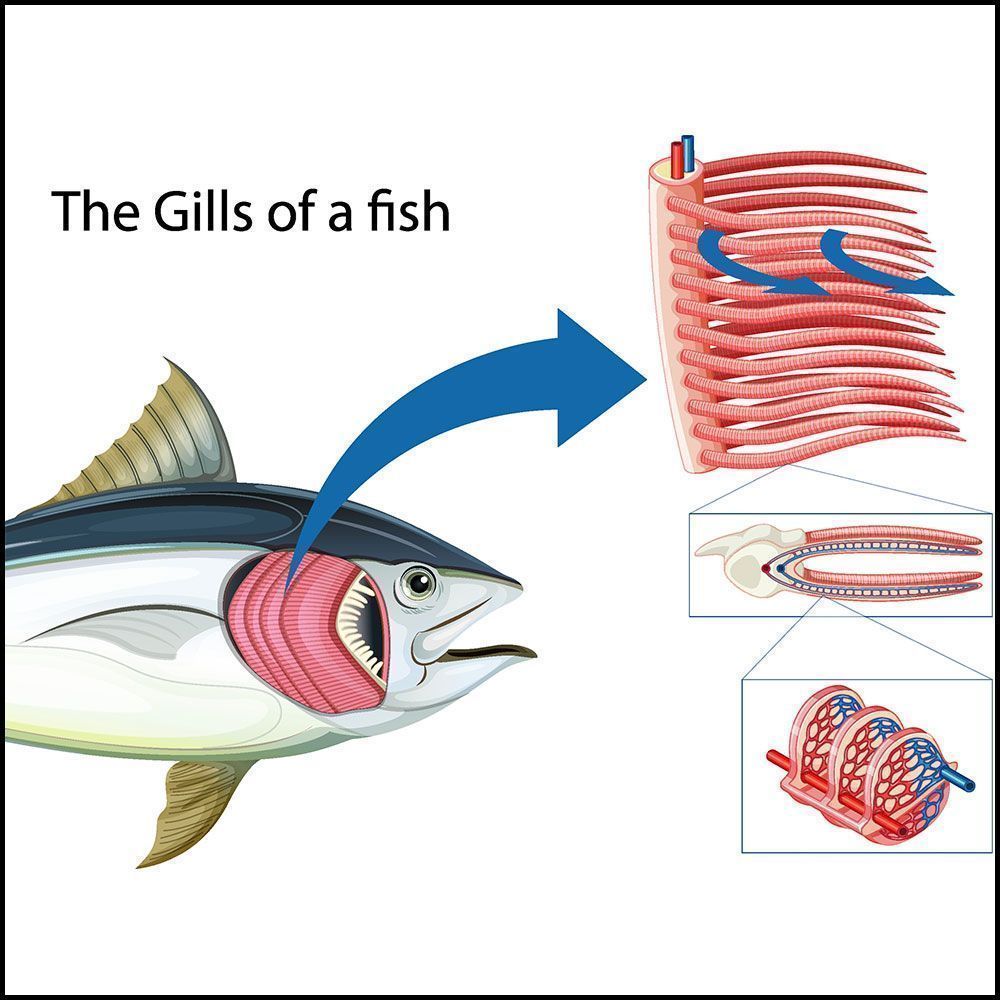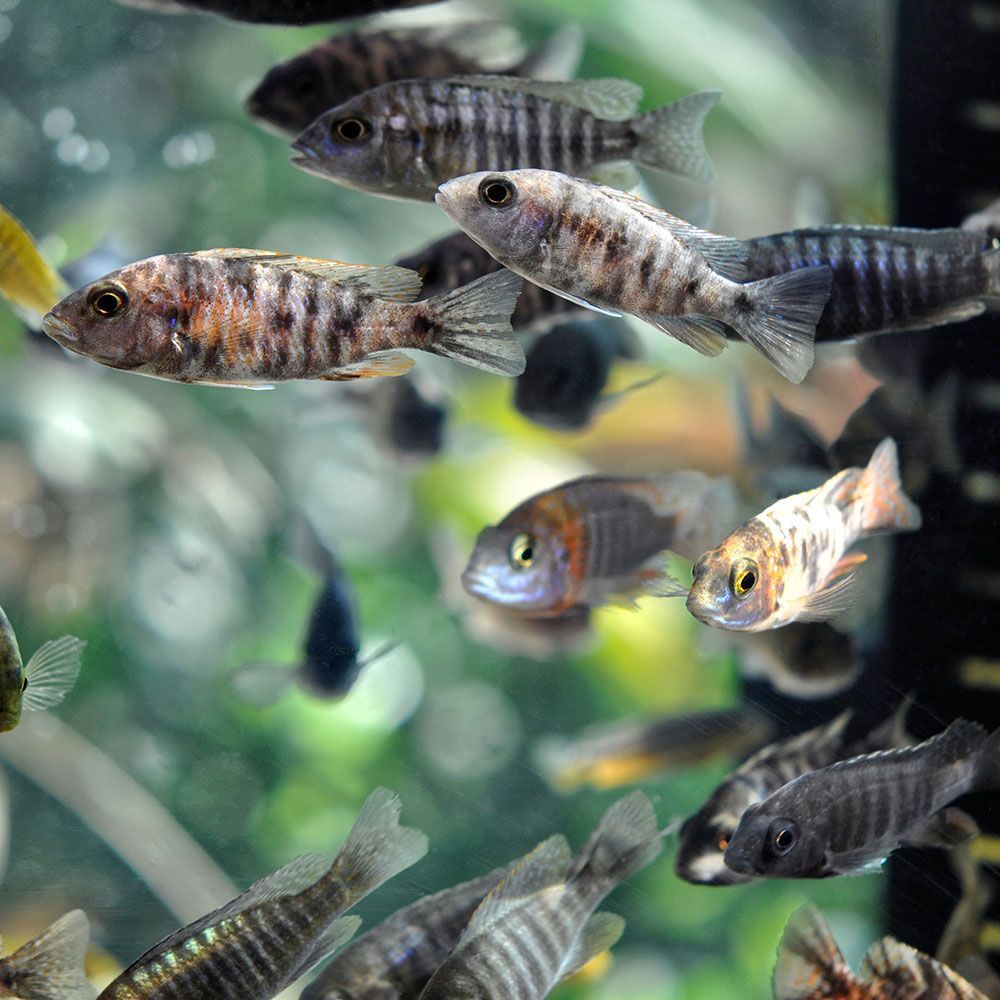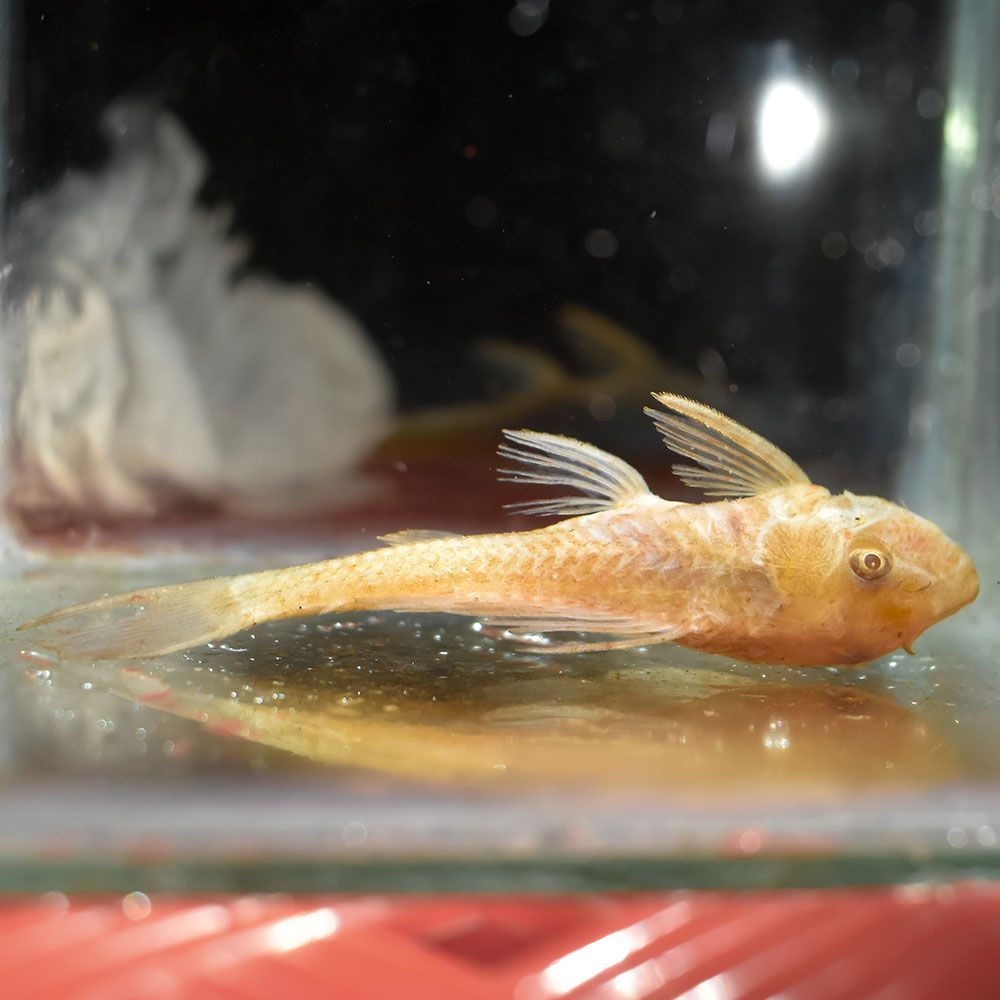Fish cannot drown in water. They suffocate in water due to low oxygen levels, pollution, damaged gills, temperature changes, or toxin exposure. When fish is on land, the gills stick together, barring a few exceptions. They can’t extract oxygen from the air through their gills and suffocate.
According to the Merriam-Webster Dictionary, the term “drown” implies dying from suffocation due to submersion in water.
This can happen to human beings or other terrestrial animals. In this, a living being’s mouth and nose are underwater; water fills their lungs and makes it hard to breathe. Their heart does not get enough oxygen and shuts down.
But fish live in water, so submersion can’t be its cause of death. They die underwater primarily due to a lack of oxygen. That phenomenon is not drowning – it’s called “suffocation” or “asphyxiation,” as per Merriam-Webster Dictionary!
On the other hand, when a fish is on land, their feathery gills get stuck together. This blocks the necessary space for oxygen exchange. Thus, it leads to suffocation again!
Now, if you’re interested in knowing how this happens and ways to avoid it in your aquarium, let us begin with the basics!
What is the Role of Dissolved Oxygen in Fish Drowning?
Oxygen is indispensable for sustaining both aquatic and terrestrial life. Fish, like humans, rely on it to create proteins, maintain cells, and store energy vital for various biological functions.
In aquariums, factors like water temperature, depth, surface agitation, and even medications can impact dissolved oxygen (DO) levels.
Air has about 210,000 parts per million (ppm) of oxygen; water typically contains 4-8 ppm of oxygen. Fish can thrive with 5 ppm of oxygen or more.
How do Fish Breathe?
Respiration involves the intake of oxygen and the release of carbon dioxide. To understand why fish might face drowning or suffocation underwater, understand how they breathe.
Breathing with Gills

Gills are four tiny filters that look like arches of red filaments on the sides of a fish’s head. They force water over their gills with an operculum – a small flap of skin that opens and closes during breathing.
Water passes over the gills, and the feathery filaments extract dissolved oxygen through epithelial tissue. This oxygen goes into their blood, which helps keep them alive. This method is known as buccal pumping.
Fish gills rely on the counter-current exchange, where water and blood flow in opposite directions, which enhances oxygen extraction.
Just like any other animal, fish breathe even while sleeping to prevent drowning/suffocating. However, adverse changes in water conditions during sleep, such as increased turbidity or reduced oxygen levels, could pose threats to fish.
Fish, being cold-blooded, can thrive on lower oxygen levels, but they still need it for survival. In fact, they need a lot of water to get enough oxygen because water has less oxygen than air. If something messes up this process, they can’t breathe properly.
Some Exceptions
Most fish rely on gills to extract oxygen from water. However, there are exceptions. So, let’s know a few other ones…
Gill & Lung Breathing
The lungfish or dipnoi are equipped with air-breathing lungs along with gills. These are actually modified swim bladders that function as primitive lungs. They gulp air at the water’s surface to survive in low-oxygen water.
For example, African lungfish can endure droughts by burrowing into mud and breathing with their lungs. Lungfish are also known as obligate air-breathers.
Labyrinth Breathing
In betta fish and various gourami species, labyrinth organs act as modified lungs. Through these organs, fish absorb atmospheric oxygen directly by swimming to the water’s surface.
This unique mechanism provides an additional means of breathing, especially in environments where dissolved oxygen levels may be limited.
Breathing on the Move AKA Ram Ventilation
Sharks, like the white, hammerhead, and mackerel sharks, along with tuna, must keep swimming to breathe. They lack a swim bladder, so they use a method called “ram ventilation.”
For this, they keep their mouths open while moving. This ensures a constant flow of water over their gills for oxygen. Even during sleep, they must stay in motion to avoid suffocation.
Some sharks, like nurse sharks, skates, and rays, can take short breaks from swimming by pumping water over their gills.
Restraints like nets hinder their continuous swimming. It leads to oxygen deficiency. They may face suffocation and death if they remain immobile for extended periods.
Some More Adaptations
- Special Organs: Salmonids and goldfish have special organs in their mouths or intestines that pull in oxygen from the air.
- Filling Swim Bladders: Salmon cleverly use air to fill their swim bladders and ensure they always have a backup oxygen tank. This allows them to swim freely.
- Skin Breathing: Baby fish can use their skin to breathe before their gills develop. Some adult fish also do a bit of skin breathing.
- Intestinal Breathing: Some fish, like loaches, can breathe through their intestines.
- Air-breathing: South America’s arapaima fish has adapted with small gills and a modified swim bladder, enabling it to absorb oxygen from the air. This helps them survive up to 24 hours out of the water.
- Rectal and Mouth Breathing: Fish, like the American eel, breathe through their rectum or mouth.
What are the Low Oxygen Signs in Aquarium Fish?
If you own a tank and worry whether your fish is also on the verge of being suffocated, keep an eye out for the following signs of low oxygen:
- Labored breathing
- Rapid gill movements
- Lethargy or reduced activity
- Unusual behavior like spending more time or gasping near the water surface
- Reduced or no appetite
- Red or inflamed gills
Take Immediate Action:
Three to four minutes of no gill movement can lead to suffocation. If you see the above symptoms, take immediate action to boost oxygen levels.
- Change up to 50% of the water immediately for relief, as fresh and clean water contains higher oxygen levels.
- Address the root cause.
What are the Causes of Low Oxygen Levels in the Aquarium?
Now, you might be wondering about the possible root cause of the situation. In aquariums, multiple circumstances can lead to a dip in oxygen levels. So, let’s know about the most common ones here:
1. Tank Size
If the tank is too small for the fish, carbon dioxide can build up, making it challenging for them to breathe.
Solution:
Either upgrade to a bigger tank or relocate some of your fish to another tank.
2. Excess Live Plants in Low-Light Aquarium
If there are too many live plants in a dark tank, the plants will consume all the oxygen for survival.
Solution:
You can use longer periods of lighting. If more photoperiod harms your fish, reduce the number of plants.
3. Slow or No Water Movement
Stagnant water lacks oxygen exchange, especially in lower water levels.
Solution:
Clean the filter. Add an extra pump or air bladder to create water movement.
4. Overpopulation

When too many fish share the same space, they consume more oxygen, and the tank may struggle to replenish it. It causes labored breathing and potential drowning/suffocation.
Solution:
Maintain an appropriate fish population to prevent overcrowding. Keep less fish than suggested. When in doubt, relocate some fish to another tank.
5. Algal Blooms
Rapid algae growth consumes oxygen during decomposition and distress fish.
Solution:
It’s usually caused by excessive nutrients in water from leftover food. Avoid overfeeding.
6. High Water Temperatures
The temperature of the water impacts its oxygen-holding capacity. Warm water holds less oxygen than cold water and affects tank oxygen levels.
Solution:
To regulate the tank temperature and ensure that oxygen levels remain suitable for the fish:
- Shield it from direct sunlight
- Adjust heaters
- Use fans
7. Less Water Surface
The surface area of the tank plays a crucial role in gas exchange, where oxygen enters the water and carbon dioxide is released. Inadequate surface area diminishes oxygen levels. This especially happens in fish bowls and vases.
Solution:
In my opinion, it’s better to avoid bowls and vases. Choose a tank with a larger surface area for efficient gas exchange and promote higher oxygen levels for the fish.
But if you use bowls or vases, add air pumps and bladders.
8. Excessive Debris
Accumulated plant and animal waste undergoes decomposition. This uses oxygen and affects fish health.
Solution:
Clean the tank regularly using a gravel vacuum and perform necessary water changes.
9. Poor Water Quality or Polluted Water
High levels of ammonia and nitrite, often found in poor water quality, can be deadly. Ammonia poisoning can burn fish organs, including their gills, leading to suffocation and drowning.
Solution:
Regular tank maintenance, including water changes and cycling, helps prevent oxygen shortages.
10. Chemical Treatments
Some additives may alter water chemistry, influencing dissolved oxygen levels.
Solution:
While chemical treatments are sometimes necessary for treating specific issues in the tank, it’s essential to be cautious. Follow recommended dosages and monitor the fish’s behavior during treatment to prevent unintended harm.
Bonus Tip: Tools like spray bars, bubblers, powerheads, and air stones can be used to improve surface water movement. This enhances oxygen dissolution in the water and aids the release of carbon dioxide.
Betta fish, which have a labyrinth organ, rely on atmospheric oxygen. They benefit from improved surface agitation.
What are the Suffocation Causes for Fish in Aquarium?
Sometimes, your aquarium fish may suffocate even though your tank is in top-notch condition. These can be due to the following reasons:
1. Gill Damage
Injuries to fish gills impair their oxygen filtration abilities. Some causes of these injuries are:
- Being harmed by other aggressive fish
- Chemical elements like nitrates and ammonia
- Diseases due to parasites and fungi like Gyrodactilus, Lernaea, and Saprolegnia
- Gill mites – They attach to the gill tissue and cause suffocation
2. Deformities in Ornamental Fish
Certain ornamental fish, such as bettas with elaborate colors and fins, might encounter drowning risks due to physical deformities. Excessive finnage, particularly when stressed or tired, can impede their breathing.
Frequently Asked Questions
Other than this, some aquarists also have the following questions during their fishkeeping journey. So, let’s clear them once and for all!
Why is my fish breathing heavily at the bottom of the tank?
Heavy breathing at the bottom of the tank indicates poor water conditions. Test water parameters, including ammonia, nitrites, and nitrates. Elevated levels of these substances can stress fish and affect their gills.
If water conditions are normal, the heavy breathing might be a sign of an underlying infection or disease. Observe the fish for other symptoms and seek appropriate treatment.
Can fish drown by being pulled backward?
While fish won’t drown when pulled backward, the action can disrupt their natural swimming and breathing patterns. Stress and exhaustion induced by being pulled backward may weaken the fish’s overall health.
Is too much oxygen in a fish tank a concern?
If your aquarium water is saturated with oxygen, no harm will be caused to your pet fish.
However, excessive dissolved oxygen to the point that the water is supersaturated can be lethal. It causes the gas bubble disease.
It’s usually not possible for aquarium water to become supersaturated. But the following situations may cause it:
- Combination of high temperature and low pressure.
- Leaky water pipes and cavitation pumps lead to air entry into the tank.
- Rapidly heated aquarium, which causes excess oxygen from the (initially cold) water to get trapped.
Can fish drown if they go too deep?
This is not a possible scenario for most home aquariums. The question is more befitting for fish in the wild.
Fish typically adjust their depth based on oxygen availability and other environmental factors. While they won’t drown by swimming too deep, there is a risk of asphyxiation if oxygen levels decrease significantly in deeper areas.
Fish instinctively move closer to the surface when they sense reduced oxygen to breathe adequately.
A word from FishInAquarium
Fish don’t drown like humans, but they suffocate due to a lack of sufficient oxygen in the water. They also suffocate on land, but that’s due to the gills being stuck and incapable of passing air.
And in aquariums, fish suffocate for several reasons. So, if you’re a fishkeeper, make sure you stay alert about suffocation signs. Keep the knowledge of the causes and respective solutions. This will help you take top-notch care of your fin buddies.
If you found the article insightful, share it with other fellow aquarists. However, if you have questions, feel free to drop us an email and we will take it over from there.


